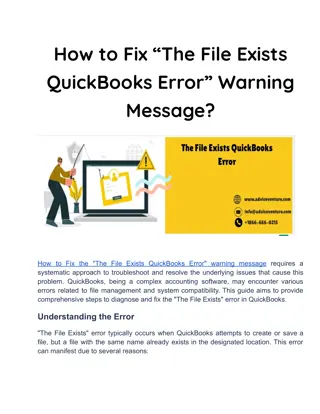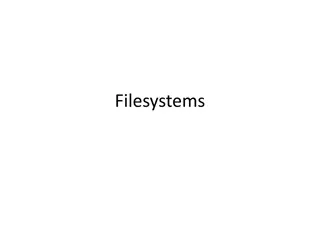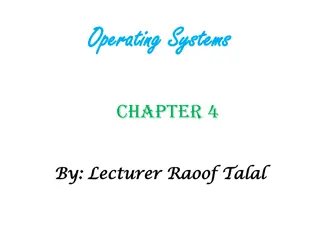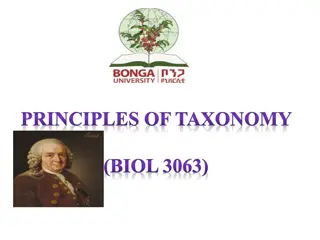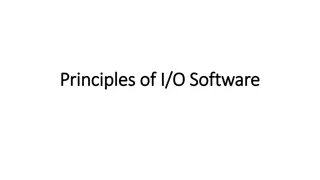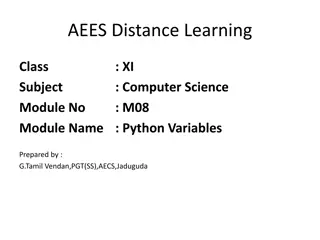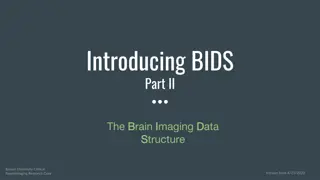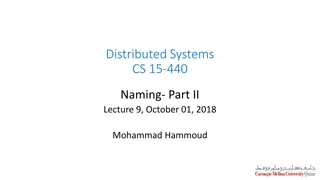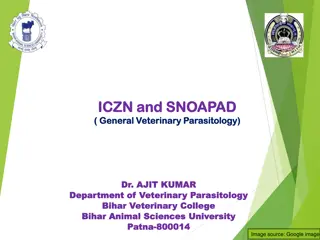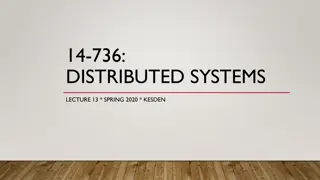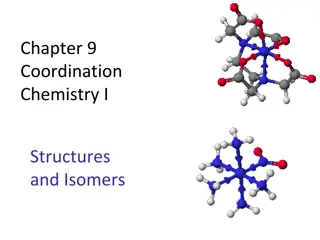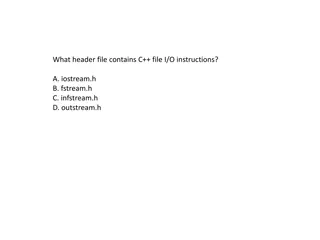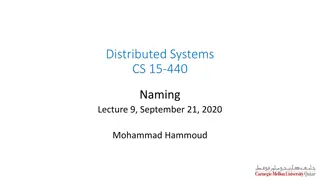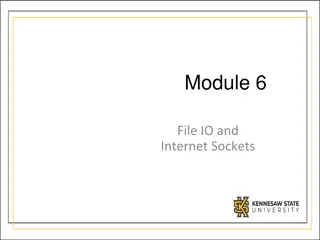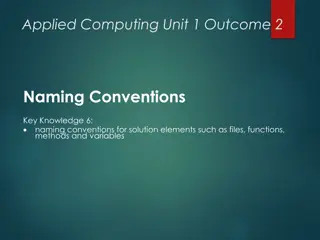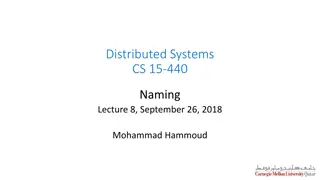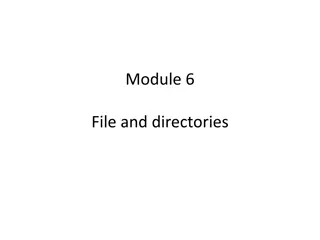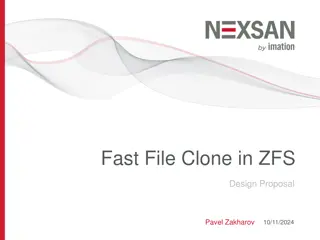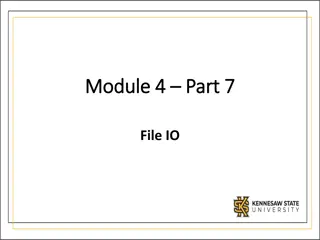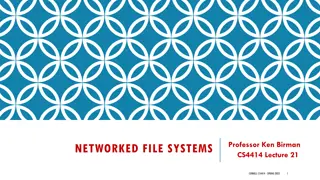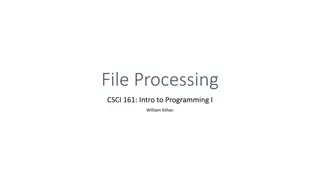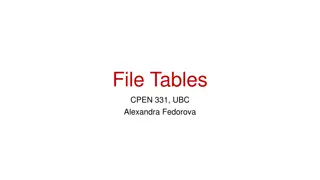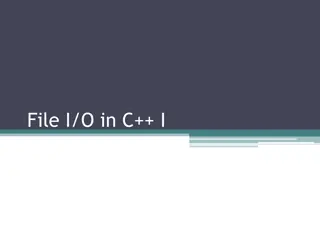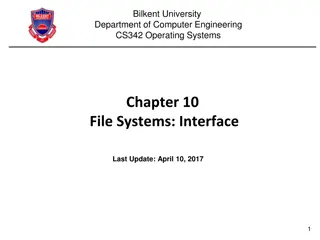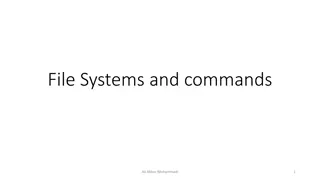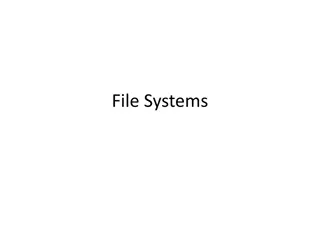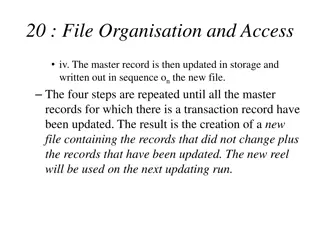How to Fix Quickbooks Error 80070057?
How to Fix Quickbooks Error 80070057?\nQuickBooks Error 80070057 can disrupt financial management. It occurs due to file extension issues or data damage. Symptoms include inability to open files and error code display. Causes involve incorrect file extensions or firewall settings. Diagnostic tools l
1 views • 5 slides
How to Fix “The File Exists QuickBooks Error” Warning Message
How to Fix the \"The File Exists QuickBooks Error\" warning message requires a systematic approach to troubleshoot and resolve the underlying issues that cause this problem. QuickBooks, being a complex accounting software, may encounter various errors related to file management and system compatibil
0 views • 5 slides
Understanding Filesystems: A Comprehensive Overview
File systems provide a structured approach to storing and organizing data on secondary storage devices. They involve logical organization of files, directories for grouping related files, sharing data between users, and managing permissions. Files contain data with attributes like size, ownership, a
3 views • 29 slides
Implementation of File System in Operating Systems
Various structures, such as boot control blocks and directory implementations, play a crucial role in implementing a file system in operating systems. These structures help in managing disk and in-memory data efficiently, ensuring effective file storage and retrieval. Linear lists and hash tables ar
1 views • 22 slides
Efficient File Naming Conventions and Folder Organization
Learn best practices for naming files and structuring folders to improve organization and efficiency. Explore tips on file naming, consistency, leading zeros, format limitations, and folder hierarchy. Enhance your workflow by implementing a logical system that streamlines file management.
0 views • 13 slides
Fundamentals of Taxonomy Explained: From Classification to Nomenclature
Taxonomy, derived from Greek roots, encompasses the science of classifying organisms and understanding their variations, evolutionary relationships, and naming conventions. It involves description, identification, classification, and nomenclature of both living and extinct organisms. The practices o
1 views • 39 slides
Mastering Compound Naming for Chemistry Students
Develop your ability to name compounds and write their chemical formulas with ease by understanding the naming conventions for different compound types. Learn about compounds composed of metal and non-metal elements, compounds containing oxygen, and those made only of non-metals. Practice naming spe
2 views • 14 slides
Family Relations and Relatives Naming Guide
Explore a comprehensive guide to naming relatives based on family relationships, from uncles' sons to sister's daughter's brother's father. Learn how to identify and address various family members accurately using distinctive titles.
0 views • 24 slides
Understanding the Implementation of XML Results File G for Exams in England and Wales
The XML Results File G is introduced as a new method to provide schools with additional exam data beyond overall results. Initially used by four boards, the file follows the A2C XML Schema for compatibility with SIMS7 and NextGen. While optional for now, the XML file naming convention and guidelines
1 views • 43 slides
Principles and Goals of I/O Software Explained
This informative content discusses the principles and goals of I/O software, including device independence, uniform naming, error handling, synchronous vs asynchronous operations, and buffering. It emphasizes the importance of writing programs that can access any I/O device without specifying the de
5 views • 20 slides
Understanding TVT Digital Technology Co., Ltd. Product Naming Rules
This document by Shenzhen TVT Digital Technology Co., Ltd. provides detailed insights into their product naming rules. It covers the overall classification, codec specifications, DVR configurations, and more, aiding customers in better understanding TVT products through clear naming conventions.
0 views • 41 slides
Python Variables: Understanding Declaration, Naming Rules, and Assignment Operators
Python variables are essential for storing values in reserved memory locations. This article covers the basics of variables in Python, including declaration, assigning values, naming rules, multiple assignments, deleting variables, and assignment operators. Learn how to create, name, and manipulate
0 views • 11 slides
Understanding BIDS File Naming Conventions
BIDS (Brain Imaging Data Structure) establishes standardized naming conventions for organizing neuroimaging data. It outlines rules for labeling subjects, sessions, tasks, runs, modalities, and exceptions. The structure helps maintain consistency and facilitates data sharing and collaboration in the
7 views • 11 slides
Understanding Naming in Distributed Systems
Exploring the concepts of naming in distributed systems, including flat naming, structured naming, name spaces, name resolution, and name linking. Examples and visual explanations are provided to illustrate each concept, emphasizing the importance of structured and organized naming schemes in distri
0 views • 28 slides
Understanding Naming Rules in Veterinary Parasitology
Explore the essential rules and regulations defined by the International Code for Zoological Nomenclature (ICZN) in the field of General Veterinary Parasitology. Learn about the nomenclature of parasites, scientific naming conventions for genera and species, and the classification of parasites in th
1 views • 14 slides
Understanding Distributed File Systems
A distributed file system manages files across multiple machines on a network, providing users with a seamless experience as if they were using a local file system. This system abstracts details such as file locations, replicas, and system failures from the user, ensuring efficient and reliable file
0 views • 35 slides
Understanding Coordination Chemistry: Structures, Isomers, and Naming
Exploring coordination chemistry involves understanding structures, isomers, naming conventions, and common coordination numbers, all essential in studying coordination compounds. Coordination compounds consist of central metals, ligands, and charge balancing ions. Naming involves listing cations, l
0 views • 46 slides
The Importance of Naming in Software Development
Effective naming of variables, functions, and concepts is crucial in software development to enhance readability, maintainability, and communication among team members and stakeholders. This article stresses the significance of thoughtful naming conventions, providing insights into the impact of nam
0 views • 50 slides
ENOVIA V6 File Name Cleanup for Data Migration
Problematic file names with unsupported characters can hinder data migration into ENOVIA V6, impacting object busname, titles, and filenames. This article proposes a solution involving filename changes, database updates, and file vault maintenance. The methodology includes SQL queries for analysis,
0 views • 5 slides
Attachment Wizard and File Management: A Comprehensive Guide for Efficient Workflows
Empower yourself with the knowledge and tools presented in this guide to effectively manage files, streamline attachments, and optimize your workflow. Discover best practices, learn about file naming conventions, explore different attachment methods, and enhance your productivity through expert tips
0 views • 12 slides
Essential Information on Naming Compounds, Cations, and Anions
Learn about the essential elements, symbols, and polyatomic ions you need to know for naming compounds correctly. Understand rules for naming compounds when elements combine, including diatomic molecules, halogens, oxygen, and sulfur. Explore polyatomic ions with different charges and their names to
0 views • 12 slides
Understanding C++ File I/O Operations
Learn about C++ file I/O operations, including input/output instructions, file handling with ifstream and ofstream, opening multiple files, checking end of file, and a review of the file I/O process. Discover how to write to an ASCII file and read data from it in C++ programming. Practice with examp
0 views • 47 slides
Understanding Distributed Hash Table (DHT) in Distributed Systems
In this lecture, Mohammad Hammoud discusses the concept of Distributed Hash Tables (DHT) in distributed systems, focusing on key aspects such as classes of naming, Chord DHT, node entities, key resolution algorithms, and the key resolution process in Chord. The session covers various components of D
0 views • 35 slides
Understanding File Input/Output in Java
Learn about file input/output operations in Java. Explore how to read and write data to files, handle exceptions using try/catch, work with streams, understand the process of file handling, and examine file structure examples like storing airline data. Enhance your Java programming skills by masteri
0 views • 41 slides
Best Practices for Naming Conventions in Solution Development
Understand the importance of naming conventions for files, functions, methods, and variables. Learn how proper naming can enhance code readability, avoid potential errors, and ensure consistency across projects. Discover tips to create effective names that are easily understood, self-descriptive, an
0 views • 20 slides
Understanding Sample Ballots: Production, Distribution, and Naming Process
Explore the significance of sample ballots in elections, detailing how they are produced, distributed, and named. Discover their usage, importance for different elections, creators, and the methods of delivery to election administration systems. Learn about file naming conventions, ballot vendor inv
0 views • 14 slides
Understanding Naming Systems in Distributed Systems
Entities in distributed systems are uniquely identified using names, addresses, and identifiers. Naming systems assist in name resolution and can be categorized into flat, structured, and attribute-based naming. Flat naming uses random strings as identifiers, and various mechanisms such as broadcast
0 views • 21 slides
Understanding File Handling in Perl
File handling in Perl involves using filehandles as references between your program and the operating system's file structure. Learn about naming conventions for filehandles, opening files, checking file open status, using pathnames correctly, and handling potential issues with paths in this informa
0 views • 52 slides
Master Set of High School Chemistry Naming Rules
A collection of chemical compounds with their names and classifications as ionic or molecular. Includes explanations and ratios for naming compounds such as Co(OH)3, Mn(NO2)3, SiO2, Mn(MnO4)4, SF2, and ZrO2. Helpful for high school chemistry students to practice and understand naming rules.
0 views • 49 slides
Standard Naming Convention for Table of Contents
This document outlines the standard naming convention for organizing and labeling Table of Contents related to payer and issuer information, plan details, file types, and extensions. It includes specific examples and guidelines for naming files accurately and consistently. Adherence to these standar
0 views • 38 slides
Fast File Clone in ZFS Design Proposal Overview
This document details a proposal for implementing fast file clone functionality in ZFS, allowing for nearly instant file copying through referencing. The motivation behind this proposal includes support for VMware VAAI, NAS Full File Clone, and Fast File Clone to save memory and disk space. The prop
0 views • 29 slides
Understanding File Input/Output in Python Programming
Exploring the basics of File I/O (Input/Output) in Python, including reading from and writing to text files. Learn how to read all content from a file as a string or a list, and how to write data to a file using Python's file handling capabilities.
0 views • 12 slides
Evolution of Networked File Systems in Computer Science
The evolution of networked file systems in the computer science field has been pivotal in enabling remote file storage, distributed coordination, and improved system stability. Starting from Bill Joy's innovations in the BSD version of Unix to the introduction of NFS by Sun Microsystems, the concept
0 views • 55 slides
Understanding File Processing and Input/Output Operations in Java
Gain insights into file processing and I/O operations in Java programming, covering topics such as file handling, reading files, file paths, compiler errors, exceptions, and the 'throws' clause. Learn how to work with files, handle errors effectively, and optimize your code for efficient file manage
0 views • 41 slides
Understanding File System Calls and Operations in Operating Systems
Explore the concepts of file system calls, opening files, reading from files, setting file offsets, closing files, and maintaining file states in an operating system. Learn how to interact with files efficiently while understanding the underlying mechanisms and necessary actions for file handling.
0 views • 21 slides
Understanding File Input/Output (I/O) in C++
File Input/Output (I/O) is an essential concept in C++ programming, allowing for interaction with files stored on secondary storage devices. This involves steps like including the fstream header file, declaring file stream variables, associating them with input/output sources, opening the file, perf
0 views • 19 slides
Understanding File Systems in Operating Systems
File systems are essential components of operating systems that manage the organization, storage, and retrieval of files. This content explores the function of file systems, their interfaces, design tradeoffs, file concepts, attributes, and structures. It covers topics such as access methods, direct
0 views • 49 slides
Understanding File Systems: File Naming, Extensions, and Structure
File systems and commands play a crucial role in managing information on disks while shielding users from the complexities of storage mechanisms. This article delves into the rules of file naming, distinctions between upper and lower case letters, file extensions indicating file types, and the under
0 views • 85 slides
Understanding File System Design Challenges and Options
Exploring the complexities of file system design, this content delves into various aspects such as file layout, design constraints, data structures, design challenges, options like FAT, FFS, NTFS, and more. It discusses the challenges of locating file blocks, index granularity, free space management
0 views • 33 slides
Sequential File Maintenance and Organisation Process
In sequential file maintenance, the master records are updated and written to a new file in sequence after processing transaction records. This process continues until all relevant master records are updated, resulting in a new file with unchanged and updated records. Additional steps involve file s
0 views • 7 slides

